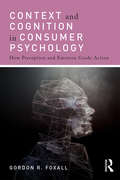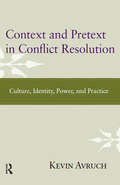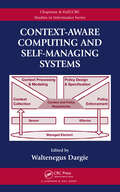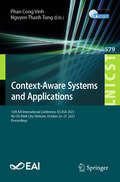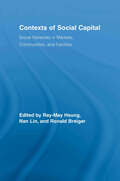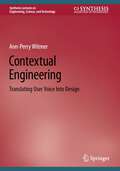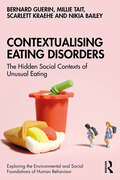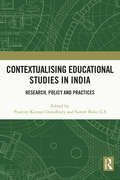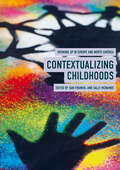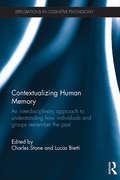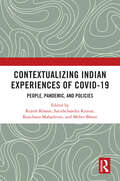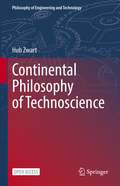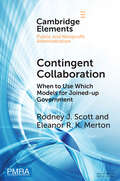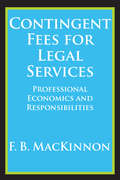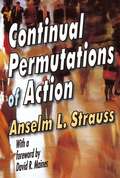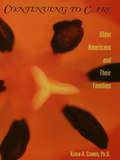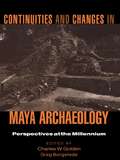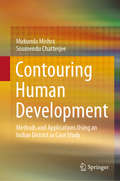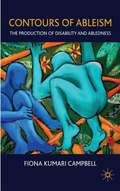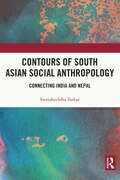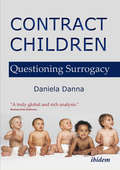- Table View
- List View
Context and Cognition in Consumer Psychology: How Perception and Emotion Guide Action
by Gordon FoxallContext and Cognition in Consumer Psychology is concerned with the psychological explanation of consumer choice. It pays particular attention to the roles of perception and emotion in accounting for consumers’ actions and their interaction with the desires and beliefs in terms of which consumer choice is frequently analyzed. In this engaging book, Gordon Foxall extends and elaborates his theory of consumer action, based on the philosophical strategy of Intentional Behaviorism. In doing so, he introduces the concept of contingency-representation to explore the ways in which consumers mentally represent the consequences of past decisions and the likely outcomes of present consumption. The emphasis is on action rather than behavior and the manner in which the intentional consumer-situation, as the immediate precursor of consumer choice, can be reconstructed in order to explain consumer actions in the absence of the environmental stimuli required by behaviorist psychology. The result is a novel reaffirmation of the role of cognition in the determination of consumer choice. Besides the concept of contingency-representation which the author introduces, the analysis draws upon psychoanalytic concepts, theories of cognitive structure and processing, and the philosophy of perception to generate a stimulating synthesis for consumer research. The book will be of interest to students and researchers in consumer behavior and economic psychology and to all who seek a deeper interdisciplinary understanding of the contextual and cognitive interactions that guide choice in the market place.
Context and Pretext in Conflict Resolution: Culture, Identity, Power, and Practice
by Kevin AvruchWritten by a distinguished scholar, this book explores themes of culture, identity, and power as they relate to conceptions of practice in conflict resolution and peacebuilding. Among the topics covered are ethnic and identity conflicts; culture, relativism and human rights; post-conflict trauma and reconciliation; and modeling varieties of conflict resolution practice. Context and Pretext in Conflict Resolution is the winner of the 2014 Conflict Research Society Book of the Year Prize.
Context-Aware Computing and Self-Managing Systems
by Waltenegus DargieBringing together an extensively researched area with an emerging research issue, Context-Aware Computing and Self-Managing Systems presents the core contributions of context-aware computing in the development of self-managing systems, including devices, applications, middleware, and networks. The expert contributors reveal the usefulness of contex
Context-Aware Systems and Applications: 12th EAI International Conference, ICCASA 2023, Ho Chi Minh City, Vietnam, October 26-27, 2023, Proceedings (Lecture Notes of the Institute for Computer Sciences, Social Informatics and Telecommunications Engineering #579)
by Phan Cong Vinh Nguyen Thanh TungThis book constitutes the refereed post-conference proceedings of the International Conference on Context-Aware Systems and Applications, ICCASA 2023, held in Ho Chi Minh City, Vietnam, in October 2023. The 14 revised full papers presented were carefully selected from 36 submissions. The papers cover a wide spectrum of modern approaches and techniques for smart computing systems and their applications.
Contexts of Social Capital: Social Networks in Markets, Communities and Families (Routledge Advances in Sociology)
by Ray-May Hsung Nan Lin Ronald L. BreigerThe concept of social capital refers to the ways in which people make use of their social networks in "getting ahead." Social capital isn’t just about the connections in networks, but fundamentally concerns the distribution of resources on the basis of exchanges. This volume focuses on how social capital interacts with social institutions, based on the premise that markets, communities, and families are the major contexts within which people meet and build up social networks and the foci to create social capital. Featuring innovations in thinking about exchange mechanisms, resource distribution, institutional logics, resource diversity, and the degree of openness or closure of social networks, these chapters present some of the most important advances in this essential field. Paralleling these theoretical developments, the chapters also improve practical methodological work on social capital research, using new techniques and measurement methods for the uncovering of social logics.
Contextual Engineering: Translating User Voice Into Design (Synthesis Lectures on Engineering, Science, and Technology)
by Ann-Perry WitmerThis book shows readers a new way of thinking about the engineering design process, as well as how to expand their understanding of the role of technical designers in society, whether working with international communities or user populations from their own hometown. As readers build an understanding of Contextual Engineering, this book will challenge them to think about the applicability of the concept more broadly, not only in terms of technical design but in personal and professional interactions with others as well. At the same time, readers will learn techniques to explore their own predispositions and the biases they may not be aware they have, equipping them to interact with others more impartially. This self-reflection process also assists the designer in working with and accepting the uncertainty that is inherent in exploring context.
Contextualising Eating Disorders: The Hidden Social Contexts of Unusual Eating (Exploring the Environmental and Social Foundations of Human Behaviour)
by Bernard Guerin Millie Tait Scarlett Kraehe Nikia BaileyThis book rethinks the diagnosis and treatment of eating disorders by putting the spotlight on their social and societal contexts, examining how these behaviours are shaped by the difficult life conditions of those suffering.Drawing on the lived experiences of nine women, this book uses in-depth case studies and interviews to discuss eating disorders with a Social Contextual Analysis framework. It prioritises the women’s own voices about their life conditions and recovery to explore the behaviour of unusual eating patterns. The book identifies common social properties across the nine women, which will become essential context when considering treatment and therapy for unusual eating. Through this more compassionate approach, readers are presented with a detailed example of new ways to analyse and treat the behaviours of mental health and therapy outside of a DSM diagnosis.Contextualising Eating Disorders is unique in its focus on giving priority to women’s voices and the social contexts behind unusual eating and will be highly relevant for all professionals working with those with unusual eating patterns, as well as students and academics in the fields of social psychology and mental health. This book will also benefit those who themselves are suffering from unusual eating patterns they might not understand.
Contextualising Educational Studies in India: Research, Policy and Practices
by Pradeep Kumar Choudhury Suresh Babu G.SThis volume presents an interdisciplinary framework to map out contemporary educational studies in India. Based on conceptual tools, quantitative methods and ethnographic accounts drawn from extensive fieldwork, it addresses emerging discourses on educational policies, their operation in the everyday functioning of institutions and actual practices in teaching and learning. Individual chapters discuss the intersectionality in the current educational system of region, gender, class, caste and minorities. With comparative perspectives and case studies from across states, including under-studied rural and urban regions of India, the book explores a wide range of issues affecting the educational system, including socioeconomic and gender inequalities; the educational status of tribal settlements in the hinterlands and their respective urban areas; the marginalisation of minorities; challenges in accessing educational avenues and choices; and the model for imparting vocational education and training. It navigates complex sites of discrimination and exclusion in the institutional spaces of the educational system and assesses the consequences of market dynamics and ideological undercurrents. Presenting first-hand information from the field, it evaluates educational policies, practices and research; investigates challenges and failures; provides suggestions and fosters critical thinking for a knowledge society. The findings in this book will be of interest to researchers, scholars and teachers of education, economics, sociology, urban education and the politics of education, as well as of public policy, governance and development studies. It will also be useful to research institutions, policymakers, educationists, social scientists, education professionals, and governmental and non-governmental bodies working on education.
Contextualizing Childhoods: Growing Up in Europe and North America
by Sam Frankel Sally McNameeThis edited collection draws together a variety of contexts of contemporary childhoods, linking thinking from Canada with spaces in the UK and Sweden. The contributors explores the discourses that shape those childhoods and how this then impacts on the way that children come to experience their everyday lives. The aim of the book is not to reflect the entirety of childhood experience but to draw off particular expertise that shine a light into partial, yet significant areas of children’s lives, with the contributions engaging with a range of voices and perspectives. As a result, the collection advocates the need for childhood studies to zoom out from a predisposition to isolate the child, which has been seen as a necessary part of conceptualizing childhood. As a result, the book focuses on a ‘context’ for childhoods through a consideration of both structure and agency, and through this seeks to recognise the interconnected nature of the arenas within which children live their everyday lives. A range of themes are covered, including the education system, identity within the home, suicide in communities, and younger children’s 'political' engagement and sense of belonging. Contextualising Childhoods will be of interest to students and scholars across a range of disciplines, including sociology, law, and education.
Contextualizing Health and Aging in the Americas: Effects of Space, Time and Place (Aging in the Americas #4)
by Jacqueline L. Angel William A. Vega Kyriakos S. Markides Luis Miguel Gutiérrez RobledoIn this fourth volume of the series on Aging in the Americas, the editors decided to treat place primarily as contextual, with place influencing proximal factors, including social determinants, and affecting Latino aging and health. This approach is similar to trends in community health research that view place as an organizing framework for assessing social determinants and disease patterns, and as an information tool for building policies and programs that improve health by strengthening communities. Recent expert consensus views of the National Academies of Science, the Robert Wood Johnson Foundation, and national public health directors have designated place as a critical building block for improving health in American society. Yet, the field continues to evolve. The ultimate goal of place -based research and practice is to support the transformation of under-resourced communities in a deliberate way that consciously supports optimal health across the life span. Our volume takes this perspective in addressing how place affects the health of Latino older adults.
Contextualizing Human Memory: An interdisciplinary approach to understanding how individuals and groups remember the past (Explorations in Cognitive Psychology)
by Charles B. Stone and Lucas M. BiettiThis edited collection provides an inter- and intra-disciplinary discussion of the critical role context plays in how and when individuals and groups remember the past. International contributors integrate key research from a range of disciplines, including social and cognitive psychology, discursive psychology, philosophy/philosophical psychology and cognitive linguistics, to increase awareness of the central role that cultural, social and technological contexts play in determining individual and collective recollections at multiple, yet interconnected, levels of human experience. Divided into three parts, cognitive and psychological perspectives, social and cultural perspectives, and cognitive linguistics and philosophical perspectives, Stone and Bietti present a breadth of research on memory in context. Topics covered include: the construction of self-identity in memory flashbulb memories scaffolding memory the cultural psychology of remembering social aspects of memory the mnemonic consequences of silence emotion and memory eyewitness identification multimodal communication and collective remembering. Contextualizing Human Memory allows researchers to understand the variety of work undertaken in related fields, and to appreciate the importance of context in understanding when, how and what is remembered at any given recollection. The book will appeal to researchers, academics and postgraduate students in the fields of cognitive and social psychology, as well as those in related disciplines interested in learning more about the advancing field of memory studies.
Contextualizing Indian Experiences of Covid-19: People, Pandemic, and Policies
by Edited by Rajesh Kharat, Satishchandra Kumar, Kanchana Mahadevan, and Meher BhootThis volume captures the social, political, psychological, administrative, and policy dimensions of the COVID-19 pandemic in the Indian context. The book is divided into four parts. Part I highlights social narratives from underprivileged workers, ASHA workers, the LGBTIQ+ community, and sanitary workers. It documents their struggles to develop mitigation, adaptation, and resilience strategies. Part II includes case studies and stories of self-management, the mental health of students from rural and urban Maharashtra, and of caregivers. It unveils the path of transformation of self to deal with the issues of anxiety and emotional turmoil caused during and due to the COVID-19 pandemic. Part III consists of resilience, philosophical hope, and solidarity, which reflect the contribution of seva by the Sikh community. It also highlights the contribution of government organizations like Indian Railways, Air India, and the Employee Provident Fund Organization to provide relief to both the people of India and Indians residing abroad to bring people back to the country during the unprecedented times. Part IV discusses the responses of various states of India to the COVID-19 pandemic and the implementation of policies by the government of India during those times.Based on empirical research work, this book will be useful for students, teachers, researchers, behavioral scientists, and practitioners of psychology, sociology, human geography, mental health, political science, public health, and public policy. This book will also be of interest to policymakers and the general public to understand the intricacies involved and the essential propositions with regard to pandemics.
Continental Drift
by Benjamin Grob-FitzgibbonIn the aftermath of the Second World War, Churchill sought to lead Europe into an integrated union, but just over seventy years later, Britain is poised to vote on leaving the EU. Benjamin Grob-Fitzgibbon here recounts the fascinating history of Britain's uneasy relationship with the European continent since the end of the war. He shows how British views of the United Kingdom's place within Europe cannot be understood outside of the context of decolonization, the Cold War, and the Anglo-American relationship. At the end of the Second World War, Britons viewed themselves both as the leaders of a great empire and as the natural centre of Europe. With the decline of the British Empire and the formation of the European Economic Community, however, Britons developed a Euroscepticism that was inseparable from a post-imperial nostalgia. Britain had evolved from an island of imperial Europeans to one of post-imperial Eurosceptics.
Continental Philosophy of Technoscience (Philosophy of Engineering and Technology #38)
by Hub ZwartThe key objective of this volume is to allow philosophy students and early-stage researchers to become practicing philosophers in technoscientific settings. Zwart focuses on the methodological issue of how to practice continental philosophy of technoscience today. This text draws upon continental authors such as Hegel, Engels, Heidegger, Bachelard and Lacan (and their fields of dialectics, phenomenology and psychoanalysis) in developing a coherent message around the technicity of science or rather, “technoscience”. Within technoscience, the focus will be on recent developments in life sciences research, such as genomics, post-genomics, synthetic biology and global ecology. This book uniquely presents continental perspectives that tend to be underrepresented in mainstream philosophy of science, yet entail crucial insights for coming to terms with technoscience as it is evolving on a global scale today.This is an open access book.
Contingent Collaboration: When to Use Which Models for Joined-up Government (Elements in Public and Nonprofit Administration)
by Rodney J. Scott Eleanor R. MertonThe question of how agencies can work together has been central to the field of public administration for several decades. Despite significant research, the process of collaboration can still be a fraught endeavour for practitioners. Nevertheless, agencies keep trying to work together because it is the only way to make progress on the biggest challenges facing public administrators. This Element reveals the deeply contingent nature of collaboration, rejecting the idea that collaboration can be reduced to a universal best practice. The New Zealand government has implemented such a contingent approach that maps different collaborative methods against problem settings and the degree of trade-off required from the actors' core or individual work. This Element provides a detailed case study of the New Zealand approach, and 18 embedded elements or 'model' collaborative forms for joined-up government. It explains how New Zealand public servants approach the important question: 'when to use which models?'.
Contingent Fees for Legal Services: Professional Economics and Responsibilities
by F.B. MacKinnonThe practice of contingent fees - taking a percentage share of the money recovered for damage or injury - began among lawyers as a method of providing legal services for those unable to afford counsel. It is now the dominant method of financing litigation for both rich and poor. F. B. MacKinnon, in this book, examines the ethical and economic questions within the legal profession or ethical theory in general."Contingent Fees for Legal Services" is a thoroughly documented study undertaken by the American Bar Foundation, the research affiliate of the American Bar Association. It provides the information necessary for evaluating the present status of this controversial practice and the proposals for its change. Arguments about contingent fees center around possible abuses in litigation, extreme competition for cases, increased emphasis upon winning cases, and other ethical considerations. This book describes fully the historical, professional and economic context within which contingent fees developed, without attempting to resolve the debates. In addition, the MacKinnon offers in one volume relevant court decisions, statutes and administrative regulations, estimates the proportion of cases presented under contingent fee contracts, and describes fee schedules and practices.As it permits an objective assessment of the fairness of contingent fees both to clients and to lawyers, this book will therefore interest everyone concerned with reforms of the fee system - lawyers and judges, professors and students, plaintiffs and defendants, as well as policymakers. This is an issue that continues to irritate and confound all concerned with the costs as well as rights of the legal profession and its clients.
Contingent Work, Disrupted Lives
by Belinda Leach Anthony WinsonContingent Work, Disrupted Lives examines the repercussions of economic globalization on several manufacturing-dependent rural communities in Canada. Foregrounding a distinct interest in the 'grassroots' effects of such contemporary corporate strategies as plant closures and downsizing, authors Anthony Winson and Belinda Leach consider the impact of this restructuring on the residents of various communities. The authors argue that the new rural economy involves a fundamental shift in the stability and security of people's lives and, ultimately, it causes wrenching change and an arduous struggle as rural dwellers struggle to rebuild their lives in the new economic terrain. Beginning with broader theoretical and empirical literature on global changes in the economy and the effects of these changes on labour, the text then focuses exploration on manufacturing in Ontario with an analysis of five community case studies. Winson and Leach give considerable attention to the testimony of numerous residents; they report on in-depth interviews with key respondents and blue-collar workers in five separate communities, ranging from diverse manufacturing towns to single-industry settlements. The result is an intimate contextual knowledge of the workers' lives and their attempts to adapt to the tumultuous economic terrain of 1990s rural Canada.Winner of the John Porter Prize for 2003, awarded by the Canadian Sociology and Anthropology Association.
Continual Permutations of Action
by Anselm L. StrsussRichard Bernstein expressed the view that pragmatism was ahead of its time; the same has been true of symbolic interactionism. These two closely related perspectives, one philosophical and the other sociological, place human action at the center of their explanatory schemes. It has not mattered what aspect of social or psychological behavior was under scrutiny. Whether selves, minds, or emotions, or institutions, social structures, or social change, all have been conceptualized as forms of human activity. This view is the simple genius of these perspectives. Anselm Strauss always took ideas pertaining to action and process seriously. Here he makes explicit the theory of action that implicitly guided his research for roughly forty years. It is understood that Strauss accepts the proposition that acting (or even better, interacting) causes social structure. He lays the basis for this idea in the nineteen assumptions he articulates early in the book--assumptions that elaborate and make clearer Herbert Blumer's famous premises of symbolic interactionism. The task Strauss put before himself is how to keep the complexity of human group life in front of the researcher/theorist and simultaneously articulate an analytical scheme that clarifies and reveals that complexity. With these two imperfectly related issues before him, Strauss outlines an analytical scheme of society in action. It is a scheme that rests not on logical necessity but on research and observation, and the concepts he uses are proposed because they do a certain amount of analytical work. One would be well advised to take Continual Permutations of Action very seriously.
Continuing to Care: Older Americans and Their Families in the 21st Century (Issues in Aging)
by Karen Ann Conner'Continuing to Care?' describes the challenges of an aging America and changing family system. Caregiving has always been a primary obligation of the family based on an informal intergenerational contract that specifies 'who owes what to whom.' This system of intergenerational reciprocity has been a central feature of American family life and has formed the foundation for successful social programs such as Social Security and Medicare that support older Americans. Recent changes in the American family threaten the intergenerational family contract. Changing definitions of family, increasing divorce and remarriage rates, the establishment of blended families, and dramatic changes in the age structure and intergenerational composition of the family affect the ability of this important social unit to continue to provide care to its members. Change in the American family system raises some difficult personal and social questions. What is the obligation of adult children to elderly frail parents? Are we expected to provide care ourselves or is supervising care provided by others an acceptable alternative? Do the same rules apply in the case of step parents? What is a childs obligation to a long absent father? Can Americans continue to juggle responsibility for their children with the demands of careers and the needs of aging parents? How much longer will we do it? And what will society do if we decide to stop? These questions need to be addressed as we reexamine our families caregiving role. 'Continuing to Care?' brings these questions into the public forum for consideration and debate.
Continuities and Changes in Maya Archaeology: Perspectives at the Millennium
by Charles W. Golden Greg BorgstedeThis book presents the current state of Maya archaeology by focusing on the history of the field for the last 100 years, present day research, and forward looking prescription for the direction of the field.
Contouring Human Development: Methods and Applications Using an Indian District as Case Study
by Soumendu Chatterjee Mukunda MishraThis book acquaints readers with a range of techniques to help them effectively identify, record, map, analyze and report on patterns in various dimensions of human development (HD) with spatial scales down to the village level. It is impossible to capture HD at the local and global scale with only a single index, because differences in HD at the international scale are caused by ‘general’ factors, whereas local-scale differences are influenced by ‘specific’ factors. This book offers a variety of methods for scientifically mapping HD at any spatial scale. It covers how to rationally select variables; how to test the models; how to validate the results, and how to analyze them. For this purpose, it employs a case study on an Indian district. The socio-economic factors regulating the patterns of HD are now more complex than they were only a few decades ago, making it essential to incorporate newer models in order to successfully ‘replicate’ the real-world situation. Accordingly, the book offers essential methodological tools & techniques for mapping HD. It sheds new light on a handful of statistical multivariate analysis and machine learning algorithms that are rarely used in the social sciences when dealing with HD, yet have sound mathematical and statistical bases. These techniques can be successfully used for predictive analysis in the earth & natural sciences, decision sciences and management disciplines, and are equally effective in terms of capturing, predicting and projecting the composite HD ‘landscape.’ This book will especially benefit two groups of readers: firstly, HD practitioners who want to find out ‘why some areas are doing better than others’ by exploring the complex interactions of spatially linked variables with different HD parameters. And secondly, practitioners in other branches of the social sciences who are not concerned with HD but are looking for ‘hands-on training’ with techniques they can apply in their respective field of spatial investigations.
Contours of Ableism: The Production of Disability and Abledness
by Fiona Kumari CampbellExamining what the study of disability tells us about the production, operation and maintenance of ableism, this ambitious study explores the ways abledness is understood. It provides new directions in research on 'aberrancy' and its focus on a normative ethos. Reconfiguring, challenging and extending the boundaries of a disability studies perspective, Contours of Ableism explores territories of ableism in the themes of embodiment, subjectivity, transhumanism, technologies and jurisprudence.
Contours of South Asian Social Anthropology: Connecting India and Nepal
by Swatahsiddha SarkarThis book presents a conceptual and methodological framework to understand South Asia by engaging with the practices of sociology and social anthropology in India and Nepal. It provides a new imagination of South Asia by connecting historical, political, religious, and cultural divides of the region. Drawing from the experiences of Indian and Nepali social anthropology, the book discusses the presence of Nepal studies in Indian social anthropology and vice versa. It highlights Nepal or South Asia as a subject for social anthropological research and stresses on pluriversal knowledge production through regional scholarship, dialogic social anthropology, South Asian episteme, post-Western social anthropology and the decolonisation of disciplines. In exploring the themes and problems of doing social anthropology in Nepal by Indian scholars, the book assesses the scope of developing the South Asian social anthropological worldview. It explains why social anthropological and sociological inquiry in India has failed to surpass its focus beyond the territorial limits of the nation-state. The book examines the issues of methodological nationalism and social anthropological research tradition in South Asia. By using the Saidian framework of traveling theory and Bhambra’s idea of connected sociologies, it shows how social anthropology can develop disciplinary crossroads within South Asia. This book will be of interest to students, teachers and researchers of South Asian studies, anthropology, sociology, social anthropology, South Asian sociology, cultural anthropology, social psychology, area studies, cultural studies, Nepal studies, and Global South studies.
Contraband
by Michael KwassLouis Mandrin led a gang of bandits who brazenly smuggled contraband into eighteenth-century France. Michael Kwass brings new life to the legend of this Gallic Robin Hood and the thriving underworld he helped to create. Decades before the storming of the Bastille, surging world trade excited a revolution in consumption that transformed the French kingdom. Contraband exposes the dark side of this early phase of globalization, revealing hidden connections between illicit commerce, criminality, and popular revolt. France's economic system was tailor-made for an enterprising outlaw like Mandrin. As French subjects began to crave colonial products, Louis XIV lined the royal coffers by imposing a state monopoly on tobacco from America and an embargo on brilliantly colored calico cloth from India. Vigorous black markets arose through which traffickers fed these exotic goods to eager French consumers. Flouting the law with unparalleled panache, Mandrin captured widespread public attention to become a symbol of a defiant underground. This furtive economy generated violent clashes between gangs of smugglers and customs agents in the borderlands. Eventually, Mandrin was captured by French troops and put to death in a brutal public execution intended to demonstrate the king's absolute authority. But the spectacle only cemented Mandrin's status as a rebel folk hero in an age of mounting discontent. Amid cycles of underground rebellion and agonizing penal repression, the memory of Mandrin inspired ordinary subjects and Enlightenment philosophers alike to challenge royal power and forge a movement for radical political change.
Contract Children
by Daniela DannaSurrogate motherhood is expanding all over the world. Debates rage over how public policy should consider the signing away of the parental rights of birth mothers in favor of a 'commissioning' couple or an individual. In this book, Daniela Danna describes the situation in English-speaking countries and worldwide, from California to Greece, presenting the legal alternatives regulating (or not) these peculiar exchanges. Should surrogacy remain a private agreement? Should it be treated as an enforceable contract? Are surrogate mothers workers? What happens inside the countries that have chosen different ways of handling this new and controversial matter? And, the most important question of all: How can we live in this era of new techno-medical possibilities and try to stay human? Can we resist commodification in the field of human relations concerning procreation?Contract Children discusses the different ways available to obtain a child through surrogate motherhood. It is fundamental reading for anyone wanting to be involved in the surrogacy process. It gives prospective surrogate mothers and infertile couples the background information necessary for their own informed decision. It is also an essential instrument for policy makers and activists in the field of women's rights, social justice, and children's rights. The question of how to publicly deal with surrogate motherhood touches upon our social vision of motherhood, ultimately marking the position of women in contemporary society.
